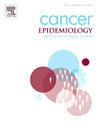Metabolic syndrome and risk of esophageal cancer by histological type: Systematic review and meta-analysis of prospective studies
IF 2.3
3区 医学
Q3 ONCOLOGY
引用次数: 0
Abstract
Background
Previous epidemiological studies have provided inconsistent findings regarding the association between metabolic syndrome (MetS) and risk of esophageal cancer.
Methods
We conducted a comprehensive literature search for prospective studies in MEDLINE and EMBASE databases through April 2024. Random-effects meta-analysis was used to calculate pooled hazard ratios (HR) with 95 % confidence intervals (CI) for the associations between MetS and risk of esophageal cancer by histological type. Between-study heterogeneity was assessed by Cochran's Q test and I2 statistics.
Results
Among 8097 identified studies, six studies were included. MetS was associated with an increased risk of esophageal adenocarcinoma (pooled HR=1.24; 95 %CI, 1.07–1.42; Pheterogeneity=0.392, I2=3.8 %, N = 6), but not esophageal squamous cell carcinoma (HR=0.89; 95 % CI, 0.58–1.36; Pheterogeneity=0.040, I2=68.9 %, N = 3). An increased risk of esophageal adenocarcinoma was indicated for hyperglycemia (HR= 1.14; 95 % CI, 1.01–1.29; Pheterogeneity=0.693, I2=0.0 %, N = 3) and obesity (HR=1.50; 95 % CI, 1.24–1.82; Pheterogeneity=0.191, I2=34.5 %, N = 5), rather than the other components of MetS, i.e. hypertension or levels of triglyceride or high-density lipoprotein. Hypertension was associated with seemingly increased risk of esophageal squamous cell carcinoma (HR=1.39; 95 % CI, 0.93–2.09; Pheterogeneity=0.030, I2=71.4 %, N = 3), while obesity was associated with a decreased risk (HR=0.65; 95 % CI, 0.38–1.12; Pheterogeneity=0.009, I2=78.7 %, N = 3); no associations were observed for the other components of MetS with esophageal squamous cell carcinoma.
Conclusions
MetS, particularly hyperglycemia and obesity, may increase the risk of esophageal adenocarcinoma. MetS, by and large, may not influence the risk of esophageal squamous cell carcinoma.
代谢综合征与食管癌组织学类型的风险:前瞻性研究的系统回顾和荟萃分析
背景以往的流行病学研究对代谢综合征(MetS)与食管癌风险之间的关系提供了不一致的发现。方法于2024年4月在MEDLINE和EMBASE数据库中进行前瞻性研究的综合文献检索。随机效应荟萃分析采用95% %置信区间(CI)计算met与食管癌组织学类型之间的关联的合并风险比(HR)。采用Cochran’s Q检验和I2统计量评估研究间异质性。结果在8097项研究中,纳入了6项研究。MetS与食管腺癌风险增加相关(总风险比=1.24;95 % CI, 1.07 - -1.42;异质性=0.392,I2=3.8 %,N = 6),但与食管鳞状细胞癌无关(HR=0.89;95 % ci, 0.58-1.36;异质性=0.040,I2=68.9 %,N = 3)。高血糖患者患食管癌的风险增加(HR= 1.14;95 % ci, 1.01-1.29;异质性=0.693,I2=0.0 %,N = 3)和肥胖(HR=1.50;95 % ci, 1.24-1.82;异质性=0.191,I2= 34.5% %,N = 5),而不是MetS的其他组成部分,即高血压或甘油三酯或高密度脂蛋白水平。高血压似乎与食管鳞状细胞癌的风险增加相关(HR=1.39;95 % ci, 0.93-2.09;异质性=0.030,I2=71.4 %,N = 3),而肥胖与风险降低相关(HR=0.65;95 % ci, 0.38-1.12;异质性=0.009,I2=78.7 %,N = 3);没有观察到MetS的其他成分与食管鳞状细胞癌的关联。结论低血糖和肥胖可增加食管腺癌的发生风险。总的来说,MetS可能不会影响食管鳞状细胞癌的风险。
本文章由计算机程序翻译,如有差异,请以英文原文为准。
求助全文
约1分钟内获得全文
求助全文
来源期刊

Cancer Epidemiology
医学-肿瘤学
CiteScore
4.50
自引率
3.80%
发文量
200
审稿时长
39 days
期刊介绍:
Cancer Epidemiology is dedicated to increasing understanding about cancer causes, prevention and control. The scope of the journal embraces all aspects of cancer epidemiology including:
• Descriptive epidemiology
• Studies of risk factors for disease initiation, development and prognosis
• Screening and early detection
• Prevention and control
• Methodological issues
The journal publishes original research articles (full length and short reports), systematic reviews and meta-analyses, editorials, commentaries and letters to the editor commenting on previously published research.
 求助内容:
求助内容: 应助结果提醒方式:
应助结果提醒方式:


